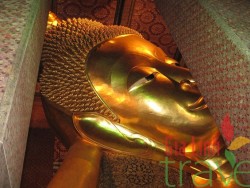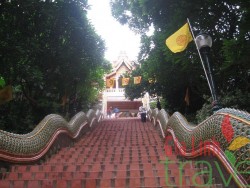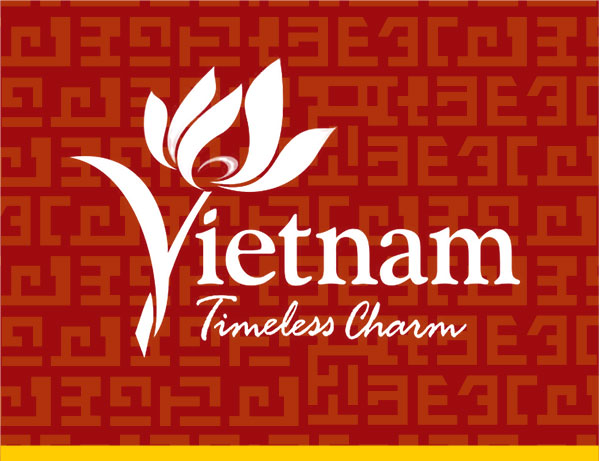Buddha statue
Thailand Religions
Alcaza show Thai Temple Religion is an inevitable factor in Thai people’s life. Present-day spiritual society is composed of dissimilar ingredients: thousands of Theravada monasteries and over a quarter of a million monks; a ubiquitous belief in spirits and ghosts; a corresponding interest in astrology, palmistry and the occult; Brahman rites and ceremonies, confined mainly to the royal court; and Mahayana Buddhism, Confucianism and ancestor worship associated with the substantial Chinese population. Religious minorities of Muslims, Hindus, Sikhs and Christians complete a rich variety of thought, philosophy, dogma, ritual, belief, superstition, worship and endeavor that is fashioned into a tolerant society with Buddhism as the dominant spiritual factor. Buddhism: Buddhism, the great eastern religion founded by the Indian Prince Siddhartha Gautama 600 years before the birth of Christ, first appeared in Thailand during the 3rd century B.C. in the area of the present day provincial capital Nakhon Pathom. Once established, it proved such a durable and pervasive force that some ethnic groups who migrated into that area during the Dvaravati period readily adopted it as their state religion. At its inception, Buddhism had been a reaction against Brahmanism, eschewing Brahmanism’s emphasis on caste and dogma regarding sacrifice and ritual. At the same time, it modified Brahmanic concepts of karma and rebirth. Briefly, Buddhism teaches that one’s life does not begin with birth and end with death but is a link in a chain of lives, each conditioned by volitional acts [karma] committed in previous existences. The concept of karma, the law of cause and effect, suggests that selfishness and craving result in suffering. Conversely, compassion and love bring happiness and well-bring. Therefore, only by eliminating desire can one find peace of mind. The ideal Buddhist aspiration is to attain perfection through Nirvana [Nibbhana], an indescribable, immutable state unconditioned by desire, suffering, or further rebirth, in which a person simply is, yet is completely at one with his surroundings. After its introduction into Thailand, Buddhism gained wide acceptance because its emphasis on tolerance and individual initiative complemented the Thais’ cherished sense of inner freedom. Fundamentally, Buddhism is an empirical way of life. Free of dogma, it is a flexible moral, ethical, and philosophical framework within which people find room to fashion their own salvation. Sukhothai’s King Ramkhamhaeng [1275-1317 A.D.] established Theravada Buddhism as Thailand’s dominant religion. It reached its height under the reign of King Ramkhamhaeng’s grandson, King Li Thai [1347-1368 A.D.], when about 30 volumes of the Buddhist scriptures were studied and rewritten by the king into one volume, the Tribhumikatha, a treatise on Buddhist cosmology and the three planes of existence-Sensuous, Corporeal, and Incorporeal. Not only was this the first Buddhist treatise by a Thai, but it was also the first known Thai Buddhist and didactic literary work. The Tribhumikatha’s impact on religious arts such as mural paintings can be seen today in many monasteries in various provinces. Through the centuries Buddhism has been the main driving force in Thai cultural development. Much of classical Thai art, particularly architecture, sculpture, painting, and early literature is really Buddhist art. Then, as now, Buddhism colored everyday Thai life. Although Buddhism became the primary and state religion, Thais always subscribed to the ideal of religious freedom. Thai constitutions have stipulated that Thai kings must be Buddhists, but monarchs are invariably entitled “Upholder of All Religions”. Consequently, the government, through the Religious Affairs Department; annually allocates funds to finance religious education and to construct, maintain, and restore monasteries, mosques, and churches. At present Thailand is the location of the headquarters of the World Fellowship of Buddhists (WFB), an international Buddhist organization consisting of 98 regional centers in 37 countries which promotes coordination and cooperation to enhance Buddhism throughout the world. Muslims: Muslims comprise Thailand’s largest religious minority and are concentrated mainly in the southernmost provinces of Narathiwat, Pattani, Yala,and Satun. Isalam is said to have been introduced to the Malay peninsula by Arab traders and adventurers during the 13th century. Most Thai Muslims are of Malay descent, reflecting the common cultural heritage Thailand’s southernmost provinces share with Malaysia. Ninety-nine per cent Sunni and one per cent Shi’ite, Thai Muslims enjoy inspirational and financial support from His Majesty the King,who provided money for translating the Koran into Thai. Each year the King or his representative also presides during celebrations commemorating the Prophet Muhamand’s birthday. Moreover, His Majesty appoints a respected Muslim religious leader as Chularajamontri, or State counselor for all Islamic affairs. The government also provides funds for building and renovating mosques. In some southern provinces where the Muslim population is substantial, government employed Muslim are allowed to leave for important Muslim festivals and allowed to work half-days on Friday, the Muslim holy day. In such provinces family and inheritance cases are judged according to Koranic law with a Muslim religious judge, or kadi, sitting on the bench. In addition, One four month’s leave with full salary is also granted to allow an employee to make the Haj, the pilgrimage to Mecca. There are approximately 2,000 mosques in Thailand, about 100 of which are in Bangkok. Some 200 Muslim schools offer secular as well as religious instruction. All in all, Thailand’s Muslims enjoy full state support and are free to teach and practice their religion according to their own tenets. Christianity Christianity was introduced to Thailand by European missionaries in the 16th and 17th centuries. These early Catholic missionaries were later joined by Protestants of the Presbyterian, Baptist, and Seventh – day Adventist sects. Their converts mainly came from ethnic minorities such as the immigrant Chinese. Despite the small number of Thai converts, Christians have made several major contributions in the fields of health and education. Thailand’s first printing press was introduced by Christians, and King Mongkut (Rama IV) learned English and Latin from Christian missionaries. Though King Mongkut reportedly told one of his missionary friends “What you teach us to do is admirable, but what you teach us to believe is foolish,” during his monkhood before ascending the throne, he nonetheless allowed Christian missionaries to give lectures, even in his own made the first smallpox vaccinations, trained the first doctors in Western medicine, and wrote the first Thai-English dictionaries. Hindus and Sikhs The approximately 20,000 Indians residing in Thailand are almost equally divided between Hindus and Sikhs. The Hindu community is mostly concentrated in Bangkok, where it worships at four main Hindu temples. There are also several Brahman shrines at which Hindus and Buddhists alike worship. The Hindus operate their own school where the curriculum is based on the Thai education system, though in addition to Thai it teaches Hindi, Sanskrit, and English. The Sikhs, too, are concentrated mainly in Bangkok. Divided into two sects, they worship at two different temples. Collectively, the sikhs operate afree school for poor children, regardless of caste, creed, or religion, and through several charitable associations they support the aged and the sick. Hindus and the Sikhs, though belonging to smaller groups, enjoy full religious rights and liberty and live with the same happiness enjoyed by the large groups in this Kingdom of tolerance and freedom, Thailand.


